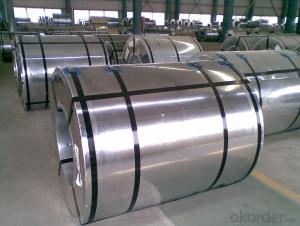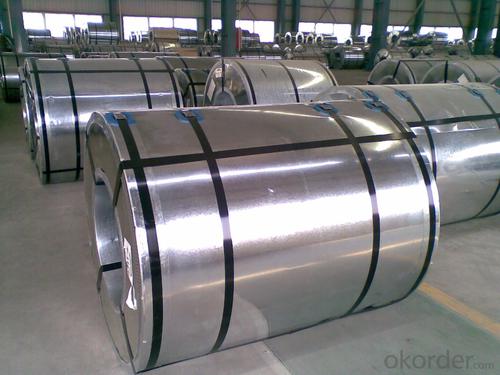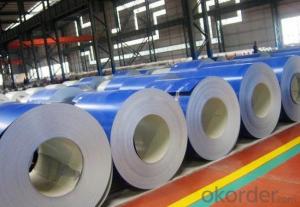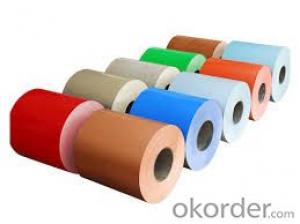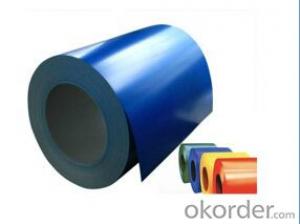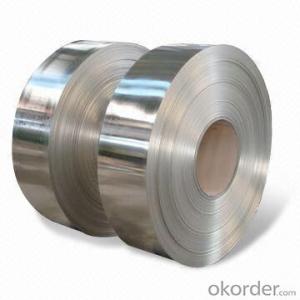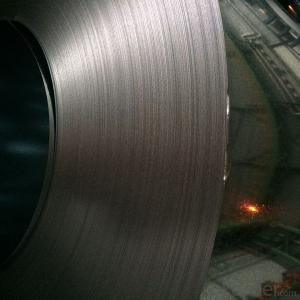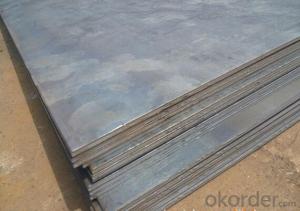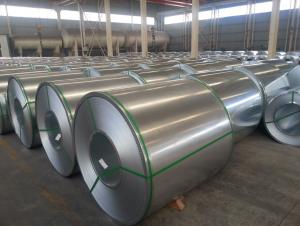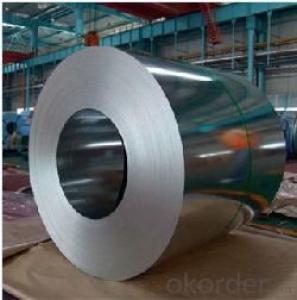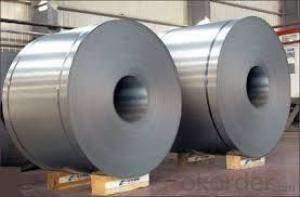Hot Dipped Galvanized Steel Coil/Sheet-Z60g
- Loading Port:
- Tianjin
- Payment Terms:
- TT OR LC
- Min Order Qty:
- -
- Supply Capability:
- 15000 m.t./month
OKorder Service Pledge
OKorder Financial Service
You Might Also Like
Galvanized steel sheet /coil features:
1. Zinc coating :60-220g/m2( as required)
2. Thickness:0.13-3.0mm
3. Width:600-1250mm(900mm,1215mm,1250mm,1000mm the most common)
4. Coil id:508mm
5. Coil weight: 3-5MT(as required)
6. Surface:regular/mini/zero spangle, chromated, skin pass, dry etc.
7. Application: With excellent cold bending molded manufacturablity, good decoration effect, strong anti-corrosion ability, galvanized steel coils and sheets are also pollution-free and easily recycled. Accordingly, they can be used as final products and basic plates of color coated steel coils and widely applied in construction, home appliances, decoration, ect.
- Q: The guy at this one pawn shop told me that stainless steel is better because it is just as strong and will not rust. The guy at the other pawn shop said that you need high carbon steel for a good sword because stainless steel breaks easily and that damascis is the best kind of steel for swords.
- Modern Sword Steels: Stainless - Used in decorative swords and knives. Stainless steel blades longer than twelve inches are too brittle for full contact use. 1045 Carbon - Strong, but soft compared to higher carbon steels. Reasonably cheap and acceptable for full contact use. 1060 Carbon - Harder than 1045, but not brittle. Holds a keen edge and is very durable. Somewhat expensive, but great for full contact use. 1095 Carbon - Sacrifices the durability of lower carbon steels for better edge retention and increased hardness. Somewhat expensive, but tough enough for full contact use. 5160 Spring - Extremely tough and durable. Great for full contact use when properly heat treated. 9260 Spring - Amazingly resilient and durable, but not unbreakable. Excellent for full contact use. T10 Tool - Exceptionally hard and tougher than other steels with similar carbon content. Keeps a good edge without sacrificing durability. Can be expensive, but is still great for full contact use. L6 Bainite - Can be very expensive, but is the toughest steel on the market when properly heat treat. Excellent for full contact use, but requires additional maintenance to prevent rust and corrosion. About Damascus Steel: Historical Damascus blades were made from wootz, an Indian steel with unique properties. The technique for making this type of steel has been lost, but there have been many attempts to recreate it. The patterns found on Damascus steel blades are a direct result of the sword-making process and are not entirely dependent on the type of steel used. Damascus swords were the finest blades of their time.
- Q: How do steel coils contribute to the marine equipment industry?
- Steel coils play a crucial role in the marine equipment industry by providing the necessary raw material for the construction of various marine equipment and structures. These coils, which are typically made of high-strength steel, offer several key contributions to the industry. Firstly, steel coils are used in the manufacturing of ships and boats. The high strength and durability of steel make it an ideal material for constructing the hulls, decks, and other structural components of vessels. Steel coils are employed to fabricate these parts, ensuring the necessary strength and integrity to withstand the harsh marine environment, including corrosion, waves, and impact. Furthermore, steel coils are essential in the production of offshore structures such as oil rigs, drilling platforms, and wind turbines. These structures require robust materials capable of withstanding extreme weather conditions, heavy loads, and corrosive saltwater. Steel coils provide the necessary strength and corrosion resistance needed for these applications, ensuring the safety and longevity of offshore installations. Steel coils also contribute to the marine equipment industry by being utilized in the construction of various marine components and equipment. For instance, steel coils are used in the fabrication of propellers, shafts, and other propulsion systems. The high strength-to-weight ratio of steel makes it an excellent choice for these critical components, ensuring efficient propulsion and maneuverability of ships and boats. Moreover, steel coils are employed in the manufacturing of marine equipment such as cranes, winches, and lifting systems. These equipment pieces require sturdy materials capable of withstanding heavy loads and continuous use. Steel coils provide the necessary strength and durability for these applications, ensuring safe and efficient operations in the marine industry. In summary, steel coils contribute significantly to the marine equipment industry by providing the necessary raw material for the construction of ships, offshore structures, marine components, and equipment. The high strength, durability, and corrosion resistance of steel make it an ideal choice for withstanding the harsh marine environment. Without steel coils, the marine industry would face challenges in building robust and reliable marine equipment and structures.
- Q: What is the role of steel coils in the production of industrial machinery?
- Steel coils play a crucial role in the production of industrial machinery as they are used as raw material for manufacturing various components and parts. These coils are typically cut, shaped, and formed into desired shapes and sizes to create structural frames, panels, gears, shafts, and other vital elements of machinery. The high strength and durability of steel make it an ideal choice for withstanding heavy loads, vibrations, and harsh operating conditions, ensuring the reliability and longevity of industrial machinery.
- Q: Im getting a new guitar soon, and it has steel strings. ive heard that nilon strings are better? thanks:)
- Classical okorder /... P.S Classical guitars are not limited to playing classical music but that is generally what they are used for.
- Q: What are the different types of steel coil slitting methods?
- There are several different types of steel coil slitting methods, including rotary shear, loop slitting, and oscillating shear. Each method has its own advantages and is used for different applications in the steel industry.
- Q: What are the common coil thickness and width combinations available for steel coils?
- The specific requirements and standards of the industry can cause the available combinations for steel coil thickness and width to vary. Nonetheless, there are commonly used combinations that can be found. There is a range of options for coil thickness, varying from thin to thick coils. Thin coils typically have a thickness of 0.4mm to 3.0mm, while medium thickness coils can be around 3.0mm to 6.0mm. Thicker coils can range from 6.0mm to 25.0mm or even higher, depending on the specific application. The coil width also varies depending on the intended usage. Common options include widths of 600mm, 750mm, 900mm, 1000mm, 1200mm, 1250mm, and 1500mm. However, wider or narrower coils can also be available depending on the specific requirements of the customer or industry. Ultimately, the most suitable combination of coil thickness and width will depend on factors such as the intended application, manufacturing processes, transportation limitations, and customer preferences. It is crucial to consult with steel coil manufacturers or suppliers to determine the most appropriate options for your specific needs.
- Q: My musical saw has, despite my best efforts, got little patches of rust on it. How Do I go about removing the rust without spending too much on rust-removal products and without affecting the properties of the steel?
- Steel wool and a bit of WD 40. Steel wool will remove the rust and the WD 40 will protect it in the future.
- Q: How are steel coils used in the production of electrical systems?
- Steel coils are used in the production of electrical systems as they provide a crucial component for generating and transmitting electric currents. These coils, made of high-quality steel, are used in a variety of applications such as transformers, motors, generators, and electromagnets. The steel coil's magnetic properties allow it to efficiently conduct and amplify electrical currents, making it an essential component in the overall functioning of electrical systems.
- Q: Can steel coils be coated with abrasion-resistant materials?
- Yes, steel coils can be coated with abrasion-resistant materials. These materials are specifically designed to provide a protective layer against wear and tear caused by friction, impact, or other forms of abrasion. Coating steel coils with abrasion-resistant materials helps to enhance their lifespan and durability, making them suitable for various applications that involve high levels of abrasion or mechanical stress.
- Q: What is steel made of and what is its molecular weight? It's for a project in chemistry class so if you have a website link as well, that would be great!
- Steel is an alloy consisting mostly of iron with a little Carbon thrown in. Steel is not a molecule, therefore, it does not have a molecular weight. Steel contains atoms of iron and carbon in a crystal lattice, along with various other alloying elements such as manganese, chromium, vanadium, and tungsten.
Send your message to us
Hot Dipped Galvanized Steel Coil/Sheet-Z60g
- Loading Port:
- Tianjin
- Payment Terms:
- TT OR LC
- Min Order Qty:
- -
- Supply Capability:
- 15000 m.t./month
OKorder Service Pledge
OKorder Financial Service
Similar products
Hot products
Hot Searches
Related keywords
